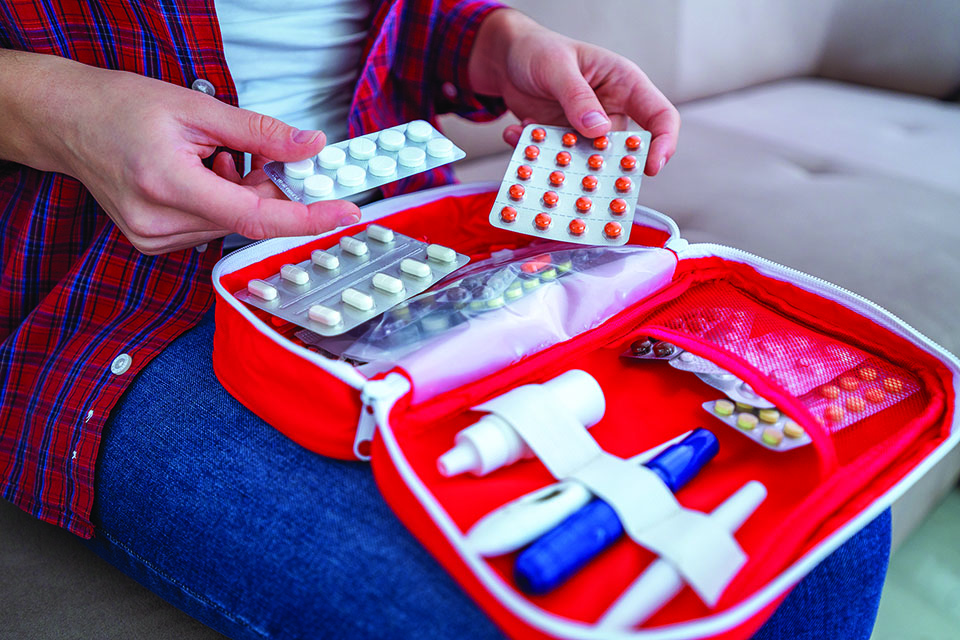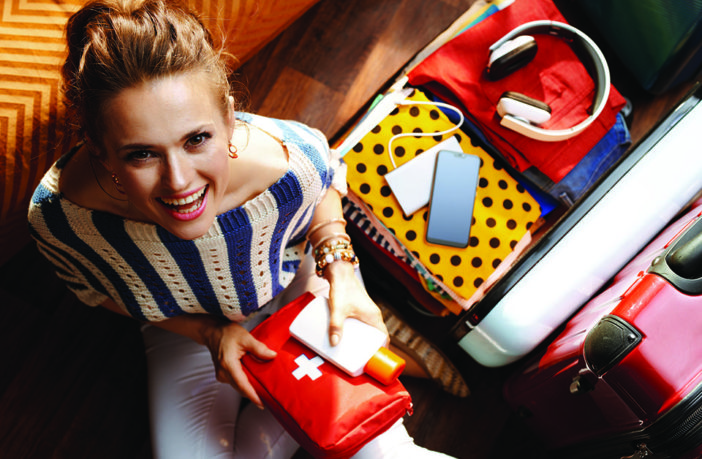by FARIHA ESHRAT, MBBS
Fariha Eshrat is a medical doctor with an interest in writing, media and PR. Fariha enjoys covering health topics and is currently a faculty at Alfaisal University. She has been an editorial and marketing team contributor at DQ Living since 2017.
Instagram: @_eshrat
Email: feshrat@alfaisal.edu
For your next holiday, use our list below to pack your must-have health essentials for a safe trip.
Health scares during vacations are a universal nightmare. Even though you can not predict or stop them, staying prepared to manage them can reduce a significant amount of stress while on the road.
RESEARCH
Read up on the countries vaccination and anti-malarial therapy requirements based on the local prevalence of diseases to avoid infections. The WHO has a country list for these. CDC Warning Levels are also helpful before planning trips. Level 3 is assigned to places that should be avoided for nonessential travel such as China for the new Coronavirus outbreak, whereas level 2 alerts are set for regions where enhanced precautions should be practised such as getting rubella titres done before visiting Japan due to their reported outbreak in early January and lastly, level 1 alerts are for practising precautions in general such as for chikungunya in Ethiopia.
REST
Traveling is harsh on your body so make sure you get plenty of rest. How much is enough? Listen to your body. At the end of each day, allow your body to rest up before the next one. Be active and roam the streets, but don’t overdo it. Take plenty of breaks in between.
STRETCH
Dedicate at least 5-10 minutes every morning to stretch before you start your day of adventure. Stretch your arms, legs, neck, shoulders, and back – you’ll feel so refreshed and be ready for a fun-filled day.
PACK FIRST AID
Basic First Aid items can be bought separately or by using a commercially available kit. It should contain everything from gloves, different sized bandages and sterile gauze to antifungal/antibacterial spray for cuts and anti-itch cream for insect bites and stings. Also add-in instant cold packs for sprains and aloe gel for sunburns. Be sure to carry sharp items like small scissors and tweezers in your checked-in luggage to avoid airport hassles.
KEEP YOUR HANDS CLEAN
Always carry antibacterial hand wipes or an alcohol-based hand sanitizer containing ≥60% alcohol to keep your hands clean.
PROTECT YOUR SKIN
Insect repellents for skin and clothing, sunscreen with ≥15 SPF with UVA and UVB protection and water purification tablets are important if you’re planning any camping trips. Put on sunscreen every time you go out.

CARRY YOUR MEDICINES
Carry copies of all prescriptions for medications, documentation of pre-existing conditions such as diabetes or allergies and a list of local hospitals or clinics including emergency services in your destination. Make sure to carry medications in its original packaging with prescriptions in case customs officials need to check it. Travel health insurance is always a good idea, most health insurances here can add a certain package to your plan for complete coverage at your travel destination.
STOCK UP
With regards to medication, make sure to pack enough of any prescription meds to last through any potential holiday extensions. Also carry paracetamol or ibuprofen for pain relief, anti-nausea medications for motion sickness, antihistamines for allergies and oral saline sachets and Imodium (loperamide) for immediate relief of diarrhea until you can get tested for any required antibiotics or have the availability of clean water.
TRAVEL INSURANCE
Don’t forget to get travel insurance before your trip.
This list can be customized depending on your travel needs (a tropical jungle trek will require different planning than a city break in Europe). For the majority of travelers, however, the items and kit listed above will cover the absolute majority of basic needs.




